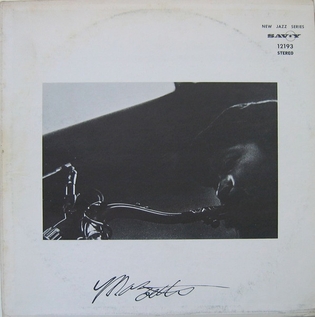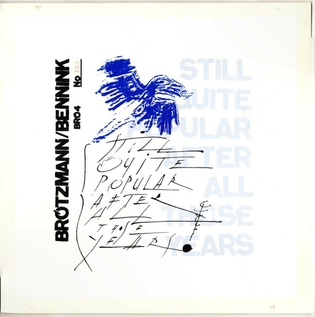
Rashied Ali, born Robert Patterson, was an American free jazz and avant-garde drummer who was best known for performing with John Coltrane in the last years of Coltrane's life.

Live in Japan is a live album by American saxophonist John Coltrane, recorded for radio broadcast during his only Japanese tour in July 1966 at two Tokyo venues, Shinjuku Kosei Nenkin Hall and Sankei Hall. The recordings feature his last group, a quintet featuring Coltrane, his wife/pianist Alice, saxophonist/bass clarinetist Pharoah Sanders, bassist Jimmy Garrison and drummer Rashied Ali.

Arthur Doyle was an American jazz saxophonist, bass clarinettist, flutist, and vocalist who was best known for playing what he called "free jazz soul music". Writer Phil Freeman described him as having "one of the fiercest, most unfettered saxophone styles in all of jazz", "a player so explosive that it seems like microphones and recording equipment can barely contain him".

@ is a studio album by John Zorn and Thurston Moore. It is the first collaborative album by the duo and was recorded in New York City in February 2013 and released by Tzadik Records in September 2013. The album consists of improvised music by Zorn and Moore that was recorded in the studio in real time with no edits or overdubs.

The Jazz Messengers were a jazz combo that existed for over thirty-five years beginning in the early 1950s as a collective, and ending when long-time leader and founding drummer Art Blakey died in 1990. Blakey led or co-led the group from the outset. "Art Blakey" and "Jazz Messengers" became synonymous over the years, though Blakey did lead non-Messenger recording sessions and played as a sideman for other groups throughout his career.
"Yes sir, I'm gonna to stay with the youngsters. When these get too old, I'm gonna get some younger ones. Keeps the mind active."

Offering: Live at Temple University is a live album by John Coltrane recorded in 1966 and released posthumously by Resonance Records on September 23, 2014, Coltrane's 88th birthday. The album won the Grammy Award for Best Album Notes and was well received by critics. Proceeds from the album benefit the John Coltrane Home.

The Sound of Nancy Wilson is a 1968 studio album by Nancy Wilson, originally subtitled "...An Experience in Motion and Emotion." It features a mixture of vocal jazz, soul, and popular music, and several prominent jazz instrumentalists perform on the album, including Benny Carter, Harry "Sweets" Edison, Shelly Manne, and pianist Jimmy Jones, who also serves as arranger and conductor. The song "Peace of Mind" was released as a single in October 1968.

Sonny's Time Now is an album by American free jazz drummer Sunny Murray, his first as a leader. It was recorded in New York City on November 17, 1965 and first released on LeRoi Jones' Jihad label. It was later reissued on the DIW and Skokiaan labels.

Luna Surface is an album by multi-instrumentalist Alan Silva, recorded on August 17, 1969 and released later that year on the BYG label as part of their Actuel series. His first recording as leader, it features Silva on violin along with a large ensemble known as the Celestrial Communication Orchestra.

Something Different!!!!! is an album by the American jazz saxophonist Albert Ayler recorded on October 25, 1962 at the Academy of Music in Stockholm, Sweden, and originally released in very small quantities on the Swedish Bird Notes label run by saxophonist Bengt "Frippe" Nordström. Ayler plays tenor saxophone and is accompanied by Swedish musicians Torbjörn Hultcrantz (bass) and Sune Spångberg (drums).

Marzette Watts and Company, also known as Marzette and Company, is the debut album by saxophonist and composer Marzette Watts. It was recorded in December 1966 in New York City, and was released by ESP-Disk in 1968. On the album, Watts is joined by saxophonist, flutist, and bass clarinetist Byard Lancaster, cornetist and trombonist Clifford Thornton, guitarist Sonny Sharrock, vibraphonist Karl Berger, bassists Henry Grimes and Juney Booth, and drummer J. C. Moses. The album, which was reissued by ESP-Disk in 2012, was recorded under the supervision of Clifford Thornton.

Duo Exchange is an album by drummer Rashied Ali and saxophonist Frank Lowe. It was probably recorded in September 1972 at the studio of Marzette Watts in New York City, and was issued by Ali's Survival Records in 1973 as the label's inaugural release. In 2020, Survival Records released an expanded double-CD album titled Duo Exchange: Complete Sessions featuring incomplete and alternate takes, as well as studio discussion.

Live at Glenn Miller Café is a live album by saxophonist Arthur Doyle and drummer Sunny Murray. It was recorded in March 2000 at the Glenn Miller Café in Stockholm, Sweden, and was released in 2001 by Ayler Records. Although the album is credited to Doyle and Murray, the first three tracks are a duet between Murray and saxophonist Bengt Frippe Nordström, who died several months after the concert.

Arthur Doyle Plays and Sings from the Songbook Volume One is a solo album by saxophonist Arthur Doyle. It was recorded in 1992, and was released in 1995 by Audible Hiss. The album features music from the "Arthur Doyle Songbook," written during his five-year imprisonment in France. It was recorded using a portable cassette machine.

Do the Breakdown is a solo album by saxophonist Arthur Doyle. It was recorded in April 1997, and was released later that year by the Ain Soph label. The album features music from the "Arthur Doyle Songbook," written during his five-year imprisonment in France. It was recorded using a portable cassette machine, and was intended to coincide with his tour of Japan in the fall of 1997. That tour yielded the album Live in Japan Doing the Breakdown.

A Prayer for Peace is a live album by saxophonist Arthur Doyle. It was recorded in June 1999, and was released in 2000 by the Zugswang label. On the album, Doyle is joined by bassist James Linton and drummer Scott Rodziczak

The Marzette Watts Ensemble is the second and final album by saxophonist and composer Marzette Watts. It was recorded in 1968 in New York City, and was released on LP by Savoy Records in 1969. On the album, Watts is joined by cornetist George Turner, trombonist Marty Cook, violinist Frank Kipers, vocalists Amy Schaeffer and Patty Waters, pianist Bobby Few, bassists Cevera Jeffries, Juny Booth, and Steve Tintweiss, and drummers J. C. Moses and Tom Berge. The album was produced by Bill Dixon, whose composition "octobersong" is featured, and who also provided liner notes and played piano on one track.

Deals, Ideas & Ideals is an album by drummer Rashied Ali, bassist Peter Kowald, and saxophonist and bass clarinetist Assif Tsahar. It was recorded on May 23 and 24, 2000, at Survival Studio in New York City, and was released in 2001 by Hopscotch Records.

Rashied Ali Quintet is an album by the free jazz ensemble of the same name, led by drummer Ali, and featuring saxophonist Bob Ralston, trumpeter Earl Cross, guitarist James Blood Ulmer, and bassist John Dana. It was recorded during 1973 at Marzette Watts's studio in New York City, and was released on vinyl that year by Ali's Survival Records. In 1999, the album was reissued on CD by Survival in conjunction with the Knit Classics label. The recording marks one of Ulmer's first recorded appearances.

Still Quite Popular After All Those Years is an album by saxophonist and clarinetist Peter Brötzmann and drummer Han Bennink. It was recorded on February 4 and 5, 2004, at the Loft in Cologne, Germany, and was released on vinyl in limited quantities later that year by Brötzmann's Brö label, which was revived in 2002 thanks to a partnership with Eremite Records.




















